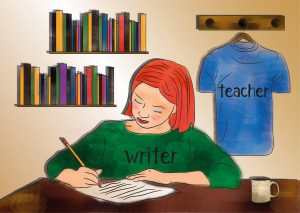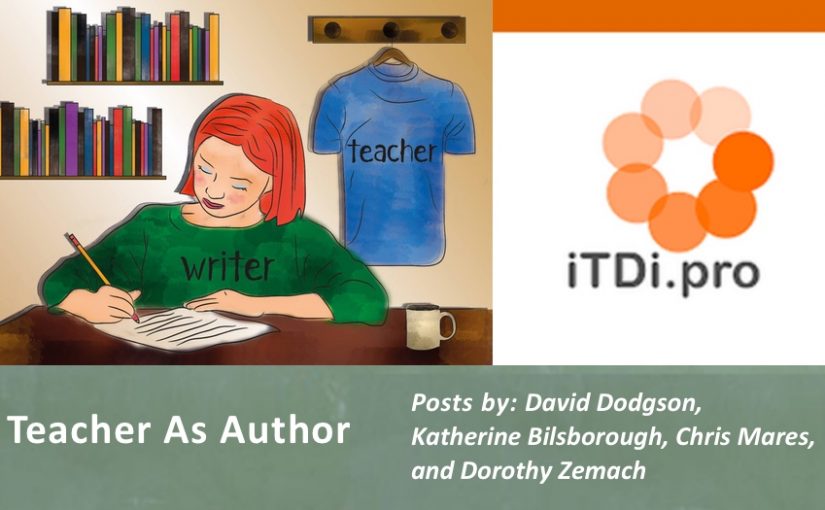From materials writing to blogging, there are many ways in which every English teacher is also an author. In this month’s issue, David Dodgson, Katherine Bilsborough, Chris Mares, and Dorothy Zemach (the trainer of the upcoming iTDI Advanced Course, Self-publishing for ELT Teachers) offer their thoughts, perspectives, wealth of personal experiences, and useful practical ideas to help any teacher find their own way as a writer.
Category: Teacher As Author
Which is Better, Writing for a Publisher or Publishing by Yourself?

By Dorothy Zemach
Recent years have seen a boom in self-publishing, or indie publishing. Pretty much anybody with a computer and Microsoft Word can crank out a book and put it up for sale on Amazon. Does this mean the death of traditional publishing (called in the biz “trad pub”)?
Heck no. At least, not for ELT textbooks. The nature of our materials is very different from a novel, which is basically just text. At the same time, though, I think self-publishing is bringing back the type of book that disappeared around the 1980s as big coursebooks took off.
So if you’re a materials writer, what type of publisher is best for you? And if you’re a materials buyer, from which type of publisher will you be able to find the most suitable materials?
I’ve written a good 20 or so textbooks for trad pub, everything from workbooks and teacher’s guides to skills books to coursebooks; and then I’ve self-pubbed fiction and ELT materials, and now in fact run a micropress that publishes my own work and that of other authors. I also work as an editor for trad publishers, my own authors, and independent authors. Drawing on that experience, then, here’s what I would advise:
Traditional Publisher
Go here if you have a big project (such as a book with several levels; or a book with many components, like a student book, workbook, website, teacher’s book, and so on). Big publishers are skilled at herding all the cats necessary to handle big projects like these.
Likewise, trad pubs are better able to handle things like audio, video, and some art requirements (like illustrations instead of stock photos) that require both expertise and a big budget.
Trad pub is also what you’re looking for if you want to write—and just write. Yes, publishers take a hefty cut of the profits; most ELT publishing contracts award only 10% or even less of the net profit to the author. A book that retails for $50 might actually earn only $2.50 or so, after all the expenses have been paid; the author’s share, then, would be .25. Some books earn more, but those figures are not atypical for the sorts of books I have published. But in return, the publisher handles at a minimum editing, proofreading, recording, design, formatting, and sales and marketing, and sometimes more, including concept and approach.
Self-Publishing
Because your expenses are lower (I assume you’re not maintaining a large home office in London or New York as well as sales offices around the globe), you can handle smaller projects—ones that wouldn’t make enough money to be worth it to a trad pub, but would still make good money for you. Think of “one off” titles; things that aren’t series. Think too materials for specific audiences, such as niches of ESP or bilingual materials meant for one country. The bigger publishers are more and more reluctant to invest in books that aren’t multilevel series; but then some of the smaller audiences with more specific needs wind up without targeted materials.
Many indies publish ebooks and print-on-demand paperbacks, rather than doing a print run of 25,000 copies. That means that indie publishing is ideal for time-sensitive material—something you want published very quickly, or something that needs constant updating. If I want to change something in a self-pubbed book, I can have those changes rolled out in 24-48 hours. For a trad pubbed book, I’d have to wait for reprints or a new edition, which could take anywhere from several months to several years to never.
Ebooks are especially suitable for short books. You don’t need to include a long introduction about the history of teaching pronunciation in the world if that isn’t necessary. I’ve published ebooks around 5,000 words long (so, roughly five times the length of this article). I say what I need to say, and then I stop. That saves the customer both time and money.
You’ll make more money per copy sold with self-publishing. Current royalty rates for ebook authors are 60-70% of cover price (not net!), and for paperbacks, once the printing costs are met, you can set your own price, and know instantly how much you’ll earn per copy.
Want to do things your own way? Self-publishing gives you that control. You decide the content—as well as the artwork, the cover, and the price. And all of those things are easy to change if you change your mind later.
Remember, though, that as an indie, you do have to do all the things. Self-publishing is more than typing. You are now the one responsible for arranging an editor and a proofreader, and then once the book is published, you’re the one in charge of marketing and publicity. With great power comes great responsibility, as they say. Think honestly about whether handling everything would be stressful for you or fulfilling.
Middle Ground
Ebook and print-on-demand technology has also given rise to small publishers, which can be a good compromise for those authors with smaller, more targeted projects who don’t wish to handle all of the non-writing aspects of the job. The publisher will still take some of your royalties in exchange for providing services, but royalty rates are generally higher than for the big trad pubs (my little company, for example, offers 50% royalties on ebooks and 40% on print, for most projects).
I love self-publishing, and I’ll only do more as the years go on. At the same time, though, I love the projects I do through traditional publishers as well. I just use different channels for different types of materials.
I don’t think there’s ever been a better time to be an author—or, for that matter, a consumer, because so many more types of works are now available to you.
* * *
If you’re interested in exploring self-publishing in-depth, I’m doing a one-month course for ELT teachers through iTDi. We’ll do everything: evaluate your materials for suitability; write the book (“we” in this case obviously means “you”—you will write your book); edit and proofread it; format it for ebook publication; design or source a cover and add interior art; discuss distribution, sales, and marketing; and finally create a finished product. It’ll be a busy month, but even if you go through the process with just a few chapters, you’ll know how it’s done. For more information, click here.
9 tips to help teachers become materials writers

By Katherine Bilsborough
The title of this blog post is misleading because when you stop to think about it, all teachers are already materials writers to a lesser or greater extent. Whether it’s a diagram on the board to help explain the difference between the past simple and the present perfect or a list of sentences illustrating how to use key vocabulary in context. Most teachers are already engaged in creating materials for their students: to recycle language, to support a course book, or to replace existing materials that don’t quite work for one reason or another. So whether you want to build up a porfolio of materials that you can use again and again with your own classes or you have a more ambitious dream of becoming a full time ELT author, the good news is … you’ve already started your journey.
Aiming for excellence
Write excellent materials for your clases. Don’t just settle for mediocre or even good. Think about what makes materials excellent and then get to work. You might like to do some background reading on the principles of ELT writing or just ask yourself questions like What am I trying to achieve with these materials? Are my materials engaging? or Would I enjoy learning from materials like these? Good materials get noticed and can become a showcase of your abilities. It makes sense to spend time polishing them until they shine.
A fresh pair of eyes
Ask a colleague to peer review your materials. Provide them with a simple checklist or framework so that they know what to look out for. A list of simple questions works well, such as Are the materials engaging for this age group? Have I provided a variety of activity types? etc. Alternatively, if appropriate, ask the students themselves for feedback. You could use an anonymous questionnaire format and ask things like Were these materials easy to follow? Why (not)? and What did you like/dislike about these materials? A friend or family member can also spot the odd typo that is easy for you to miss.
Don’t keep things to yourself
Share your materials with colleagues, either in your staff room or in an online space. When several teachers use the same materials with different groups of students, you get a better idea of (a) how well they work and (b) potential problems that might not be immediately apparent. This might also be a good time to write simple teacher’s instructions to accompany the materials – something that will be required if you find yourself in a position where you are paid to write materials. Include answer keys where necessary and anything else that can add support. Set up a focus group meeting at the end of term to discuss the pros and cons of the materials you’ve shared and to brainstorm ideas for improvement.
Have a look around
Do some research online and look at other people’s materials. Make a note of things you like and things you don’t like. Which materials are popular? Is it easy to see why? There’s nothing wrong with copying the format of materials that are good. If the layout or design of some materials works well, borrow it. Content can have copyright but style is a different matter. If you are creating a collection of lesson plans, think of a simple format and use it as a template. Consistency can make your materials look immediately more professional.
Keep everybody happy
Whether you are making print materials or online materials, consider things like accessibility and differentiation. Nobody likes to read a packed text in small font with reduced spacing. Font styles and colours that seem funky to you might actually cause headaches in extreme cases. When you’ve created your materials, ask yourself if there is anything you can add as a challenge for stronger students or as support for students who need more help. There usually is and making two versions of the same materials needn’t be a chore.
Get yourself out there!
If you want to become a professional ELT author, it’s a good idea to get noticed. Consider speaking at a conference or writing a guest blog post. Better still, start your own blog, alone or with a like-minded colleague. Join teachers’ groups on social media where you can share your ideas and links to sample materials. Ask publishers to add your name and details to their database and to consider you for writing work on upcoming projects. Make it clear that you are willing to start off small, writing Teacher Notes, online language exercises, or extra resources. Getting a chance is the best way to show your skills as a writer, and if you work well, further offers will follow.
Take a moment to reflect
Keep a journal about your progress. Just as self-reflection is a valuable tool for a teacher, it can help you become a better writer, too. Keep a record of materials you write and then go back and make a note of how well they worked in class or of things that didn’t turn out as you’d expected. Have an ideas section where you keep a note of any brainwaves you have for future materials. Build up a resource bank of useful websites for finding appropriate content, apps and tools for making things like crosswords, etc.
Practise what you preach
As teachers we are supposed to be helping our learners develop 21st century skills such as collaboration and communication. But these are essential skills for us, too. Speak to other materials writers, in person or online. Join existing groups on social media or, if you can’t find the right one, start a new group. Organise an informal meeting where you can share ideas, ask and answer questions and support each other’s projects.
And most important of all …
Enjoy this opportunity to be creative. For many of us it’s one of the best aspects of being an ELT professional.

Writing Teaching

“We write to taste life twice, in the moment and in retrospect.” – Anais Nin
Think of “writing” and “teaching” and we often make one of two connections – improving our students’ writing skills, or writing materials for our own classes or for others.
There is, however, another connection to be made – writing about our teaching. This allows us to explore our teaching by reliving moments from class again. By taking the time to sit down and commit our experiences to words we can engage in a process of reflection, learning from our successes and failures to develop as language teachers.
We can write for ourselves focusing on what is personally important to us or we can write for an audience. This may seem a daunting idea at first but relating our thoughts on teaching and in-class experiences for others to read encourages us to consider our experiences from a different point of view (much as I am doing now by writing these words for the iTDi blog!).
The opportunity to engage with an audience also provides a space for feedback. Comments from our peers can encourage us to keep on trying, or they can offer a new perspective to reflect on.
Through my own blogposts, guest posts for other websites, and articles for magazines, I have written a lot about my teaching over the last seven years or so. I am often asked two things: where do I find the time and where do I get my inspiration?
Starting with the latter question, any writer, teacher or otherwise, will tell you the same thing – the main source of inspiration is simply personal experience. The vast majority of my blogposts and articles come from the experiences I have had in class. As always, my students, along with their struggles and successes, are my inspiration.
Writers will also tell you the work of others acts as an inspiration and this is true of teaching as well. Reading blogs and articles by other teachers is a fantastic way to get ourselves thinking about our own teaching contexts. Writing offers us the chance to capture those thoughts and process them.
And that is another reason why writing about our experiences is important – it allows us to capture and preserve experiences that would otherwise be lost. From time to time, I revisit older posts in my blog and it is amazing how clearly I can remember the lessons described. It is also an insightful experience to consider how my approach has changed and what I would do differently now.
The record of personal teaching experiences in my writing has also proven invaluable when taking on responsibilities as a teacher trainer or mentor. I can easily draw on real classroom moments to illustrate my workshops and training sessions. The routine of reflection also proved highly useful when I took the Trinity Diploma. Not only could I refer in detail to past experiences, but I was also prepared to engage with my tutors when getting feedback on my teaching in an in-depth way.
As for finding the time, I see writing as a vital component of my professional development so I make time in my daily schedule for it – 10-15 minutes at the end of a lesson/day to scribble down some thoughts and time from my non-teaching hours to turn those notes into something more substantial.
So, if you are interested in making writing part of your development as teacher, how can you get started? Well, the first place to look is your own classroom by drawing on your own experiences as well as those of your students.
And as for how to write, there are several options:
- Keep a journal – the “old school” way of doing things! This could be a hand-written journal or a file on your computer of smartphone. It could take the form of quick notes or lengthier entries. I personally use Google Keep on my phone to quickly capture thoughts as notes, sound clips, or even images (e.g. snapshots of the board). These are then instantly synced with my PC, from where I can use them for…
- Blogposts – by going online, you can share your experiences with teachers around the world. This may seem like a scary prospect at first but you will soon find a supportive community of like-minded teacher bloggers who are willing to comment, offer advice, and relate their own experiences.
- Articles – there are numerous teaching magazines and teaching association newsletters that are always looking for contributors. Many teachers’ response to this idea is to think “but I don’t have anything worth sharing!” – but the truth is, you do. You have your own experiences and unique perspective to share and this is exactly what magazine and newsletter editors look for – real stories from people who work with students every day. Practical accounts of successes and lessons learned from challenges are what the readers want to see as well.
To return to the quote at the start of this article, by writing about our teaching, we can relive moments, process them, reflect on them, and learn from them. By writing online, we can share our ideas and experiences with peers around the world and perhaps inspire or encourage them in their own teaching. We can also read their words to get further inspiration of our own.
And you are already at a great place to start sharing with a vibrant and supportive community – the iTDi blog! Get in touch with our blog editor Anna and share your ideas with us in a future blog issue.
The Teacher as Author

I would never describe myself as an author, even though I have been one. I would describe myself as a writer. In the same way as I would describe myself as a reader. Writing and reading are two things I ‘do’ on a daily basis. They are an integral part of my life both in the world of teaching and outside it, too.
Reading informs me, inspires me, entertains me, and teaches me. Writing serves me personally and professionally. I write because I am creative, in the way a musician or painter is creative, and I write to hone and refine my thoughts on teaching, travel, and other matters.
To my mind, an author is someone who primarily writes for money. I have done this. It’s hard work. It takes time and sacrifice. But, of course there are rewards, at least there were back in the early nineties when it was possible for ELT authors to make decent royalties from four skills course book series, for example.
My experience as an author was back in the day when publishers were flush with money, they controlled the market and no one realized what changes were going to be wrought. The arrival of the internet, advances in technology, and the era of self-publishing were yet to come. And when they did, everything changed.
Now, getting published in some form or other is easy. Getting promoted and marketed is something else.
When I was a budding author with my pal Steve Gershon, we reviewed the market, reflected on our students needs, noted deficiencies in current materials and submitted proposals for competitive products. A competitive product in those days was the same as everything else, but different. Like most oxymorons.
I never made enough money as an author to survive solely on royalties and, to be frank, I have enjoyed being a writer much more. A writer writes. They don’t have to earn money doing it. They do it because they want to.
I associate my time as an author with writing under the direction of an editor for a specific market. The parameters were clear and the pressure relentless. First there is the writing, then the reader feedback, then the rewriting. This all takes time, during which one develops thick skin and learns to distance oneself from the criticism that inevitably comes. The most productive way to think about this type of authorship is to consider it as team work. The author is simply part of a team attempting to produce the best materials possible for the target market. In an ideal world the team are all on the same page. In practice this may not be the case. Publishers tended to be cautious. They wanted the same but different but couldn’t articulate what exactly that was. On more than one occasion I heard an editor say, “I’ll know when I see it.” The editor is key. They need to be informed, focused, clear, and relentless. Not all editors are. If your goal is to become an author, meaning that you will write a product that will be marketed and sold by a publisher, then find the right publisher and an editor you feel has the qualities I have mentioned, as well as being someone you can believe in and work for.
After the material is promoted and sold, there will be royalty checks. When I got my first royalty check, I actually owed the publisher money against my advance. That was not good for morale but par for the course, apparently.
My experience as an author helped to professionalize me in terms of materials writing, market awareness, current trends, etc. However, it was a demanding and relentless time. A work-life balance was sometimes not possible.
My experience as a writer, producing my own materials for my own use with my own students has been far more satisfying. Writing is my practice, something I do everyday. I have just completed The Richard Project, a collection of about two hundred 800(ish) word vignettes for use in class.
And this is what I write when I blog.
Remember. Whether you are an author or a writer you have to make it a practice. Do it at the same time each day. Preferably in the same place. Do it whether you feel like it or not. Never stare at a blank screen or page. Write. Anything. Eventually what you want to see will come.
On a final note, there is no such thing as writer’s block and no time for procrastination. If you suffer from either of these – author beware.





